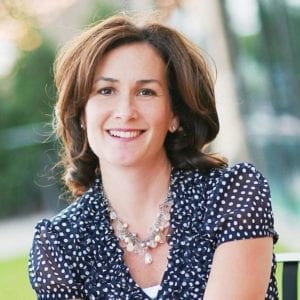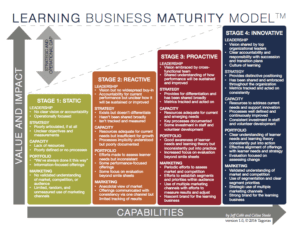
With a passion to create learning experiences that move the needle and greatly impact the success of learners in their organizations, Tara Bryan, founder and CEO of TLS Learning, is an expert in the areas of learning design and development. She is also the force behind the Course Building Secrets Podcast, and with over 80 episodes to date, she has first-hand knowledge about what it takes to successfully launch a podcast.
In this first Leading Learning episode of 2020, Celisa talks with Tara about the strengths and weaknesses of educational podcasts, and the role of podcasts in microlearning and formal training versus informal/workflow learning. Tara also shares tips for learning businesses on how to make educational podcasts a part of their educational offerings.
To tune in, just click below. To make sure you catch all of the future episodes, be sure to subscribe by RSS, Apple Podcasts, Spotify, Stitcher Radio, iHeartRadio, PodBean, or any podcatcher service you may use (e.g., Overcast). And, if you like the podcast, be sure to give it a tweet!
Listen to the Show
Read the Show Notes
[00:18] – A preview of what will be covered in this episode where Celisa interviews Tara Bryan, founder and CEO of TLS Learning.
Reflection Questions

[01:35] – You might consider the reflections questions below on your own after listening to an episode, and/or you might pull the team together, using part or all of the podcast episode for a group discussion.
- How good is your organization at capturing what Tara calls “tribal knowledge”? How might you do a better job at capturing it and making it available in a meaningful way?
- Do you treat formal training and workflow learning with equal importance, as Tara argues you should? What approaches do you use to support workflow learning? Would an educational podcast make sense for your learning business?
Highlighted Resource
[02:22] – Along with the reflection questions, we want to point you to the Learning Business Maturity Model™ as a resource to accompany the episode.
The model articulates the characteristics and practices of a mature learning business or line of business, as well as the stages that typically precede full maturity. It is intended specifically for market-facing organizations or units within organizations that focus on lifelong learning, continuing education, and professional development.
The model is a framework to help you assess capabilities and surface problem areas and provide a clear way to move from problem to opportunity and then, we hope, to innovation.
One thing Tara emphasizes is the need for a strategy, and strategy is one of the five domains we outline in the maturity model. And the idea of offering an educational podcast speaks to the portfolio domain. So this episode may get you thinking about your strategy and portfolio, and the Learning Business Maturity Model (available free of charge) will help you in that thinking.
[03:48] – Introduction to Tara and some additional background information about herself and her work.
The Course Building Secrets Podcast
[05:04] – You’re also the host and driving force behind the Course Building Secrets Podcast, which first aired earlier this year, I believe. Tell us a little about the premise of the podcast and what prompted you to start it.
Tara shares that they are currently 82 episodes in and it’s something they use to give practical tips and real-life examples and challenges for people who are building courses.
As people who are creating learning businesses, it’s really important to get your message out to the world.
She had to step into her expertise and get her message out in a bigger and broader way. And she decided to do this through podcasts, something Tara notes has been a super fun journey.
The podcast looks at how to help other people create their online course business, how to launch their signature course for the very first time, or really enhance what they’re doing in their business to make a bigger impact for their learners.
Educational Podcasts: Strengths
[06:42] – What actually brought you to my attention is the work you’re doing around educational podcasts. What do you see as the primary strengths, the most promising possibilities of podcasts for educational purposes?
Tara explains that in her work – which involves creating custom learning solutions, primarily for large corporations (and sometimes for their customers and employees) – one of the biggest challenges is how to get learning, not only to the learners themselves when they need the learning, but how to get it out faster.
Tara talks about how there are various methods to do this—audio, video, or writing. And online courses are interactive with writing and a lot of video. But a lot of times, there is a big barrier of entry for that. Either interactive learning is difficult to learn or, on the video side, a lot of times people are uncomfortable being on video.
So audio or podcasts become a really easy entry point for people to find their voice and for people to get over some of the challenges or “fear of the tech” when it comes to interactive learning.
Tara points out that if you put a video camera in front of a subject matter expert (SME), for example, all of a sudden, their personality changes. This was a huge barrier to not only capturing the message of the SMEs they were working with, but with some of the people who had to produce video.
But when you just give somebody a microphone, she says it automatically takes away a lot of the pressure/challenges so they’ve found that it’s a really effective way to get great content out of SMEs. Tara adds that they do a lot of interviewing to help get the right level of content and the right content.
Podcasting and Microlearning
[09:58] – I’m curious if you view educational podcasts as microlearning and microlearning only. Or if they can be perhaps longer form? Basically, what are your thoughts on how podcasting and microlearning might fit together?
Tara says they definitely talk about it as an informal or microlearning event within the full learning experience. But she says it also could be part of a more formal sequence.
She discusses how one of the biggest benefits of podcasts is they allow people to learn where they are (so people are often learning during their discretionary time). You can provide people with learning in a way that they can consume that’s safe and also provides them with training.
Even though it could be structured as more of a formal learning event, primarily they use it as reinforcement and pre-framing on the front and back of a learning experience.
Educational Podcasts: Weaknesses
[11:52] – Other side of the coin, what do you see as the primary weaknesses of podcasts for educational purposes? Any issues you’ve come up against with your own podcast or others you’ve worked on?
Tara points out that, as with any media, there are some disadvantages. For example, if you are doing too much multitasking when listening or are someone who learns better by watching something or doing an activity, then podcasting isn’t going to be the best method.
But it needs to work on both sides—sometimes it works really well for the person who needs to teach.
And in fact, a strength of podcasting is that it allows you to capture tribal knowledge, something you wouldn’t necessarily capture if you were doing something more formal.
This at least puts it in a place where you can do something with it and then you can turn it into something else later if you needed to. Since some people aren’t great listeners, you may lose a couple people with that but it’s all part of the full learning strategy.
And you have to be kind of interesting when speaking so it helps if the person has personality for it to work.
Podcasts: Formal Training and Workflow Learning?
[14:05] – You argue that learning professionals need to separate formal training and workflow learning—and treat them with equal importance. (See Tara’s article, “Tap into Popularity of Podcasts for Effective Microlearning”). Do you think podcasts can serve both formal training and workflow learning?
Tara talks about how one of the things they do is to focus heavily on the learner’s journey and what experiences they need in order to be successful.
So often in a formal learning event, we’re thinking about skill building and what learners need to be able to do in order to be successful. But podcasting and different sort of informal learning events around that really support real-life examples. This gets into things like storytelling and how to apply knowledge from personal examples, which really gives the depth to the skill enhancement that they’re getting in a training. And Tara believes that podcasting is a great way to capture that.
To learn more about workflow learning, check out Jane Bozarth’s report, Learning in the Workflow.
Structuring Educational Podcasts
[16:27] – What ideas or suggestions do you have for how to structure an educational podcast? You mentioned interviews with subject matter experts, and you were just talking about storytelling as a way of conveying examples. Do you have other thoughts about what form educational podcasts might take?
Tara explains there are a bunch of different ways to lead with how you want your podcast to be—stories, news, interviews, educational non-fiction, etc.
The Course Building Secrets Podcast, for example, is really focused on tips and secrets to help people be successful. They do interviews and storytelling but it’s really focused on providing that quick thing for learners to go and take action on.
Tips for Pursing an Educational Podcast
[17:47] – If an organization were to want to move forward with pursuing an educational podcast, what would you recommend as a first step or first steps?
Tara emphasizes that the first thing you really need to do is to look at your full learning strategy and where it fits/makes sense. She points out that often companies just decide to do something because it’s popular.
Once you’ve determined if it makes sense with your strategy, you need to figure out who your audience is and what kind of podcast you want to lead with/what you’ll focus on.
Tara notes this will evolve over time so you don’t need to stress too much about the specifics of all of your topics, but these are the two primary places to get started.
Time Limited vs. Open Ended Educational Podcasts
[19:15] – Do you have thoughts on educational podcasts as sort of an ongoing phenomenon versus doing a finite number of episodes focused on a particular framework? Any thoughts on whether both approaches are viable and what to think about whether you want to do more of the time limited versus open-ended?
Tara shares that in her opinion, it goes back to what your goal is. For example, if you want to create a podcast that goes to a wide audience where you’re focused on a topic but you can really keep engaging them over time, then a long-term podcast is the way to go.
However, if you’re looking at creating a podcast for a particular curriculum or topic, then it may have a different time limit. But she doesn’t recommend creating a separate one for a course, rather she suggests you bucket it around a topic (i.e., leadership or management development) and make it into something that continues to grow over time.
Tara notes there is certainly a case for making it a shorter-term podcast but that distribution would be a little bit different.
From a production standpoint, if this is a strategy that you want to add to your business to sell your courses or to enhance the experience that your audience or learners have, Tara says that over time, you will find your voice and your cadence for your podcast. And that may be totally different than what you thought when you got started because this tends to evolve based on your audience and what’s happening in the world.
When people are starting a podcast, Tara says they often ask her what they will even talk about. The beauty of it is that once you get started, all of a sudden, all these ideas start to materialize and you get excited to share them with your audience and really dig into different topics.
Celisa notes this is exactly what happened with the Leading Learning podcast.
[23:08] – We’ve been focusing on podcasts, but that’s only a small slice of what you know and do with learning, so let’s go big picture here as we begin to wind down. What’s on the horizon for learning that most excites you?
Tara reiterates that she’s passionate about all things learning and how to enhance the learning experience for the people who actually need what they have to offer. For her, one of the most exciting things is the concept of the learning experience and that it’s not just about going to a classroom or taking an e-learning.
It’s really that shift from content-centered learning events to how do we bring learning experiences closer to our learners when they need them. And to then provide them with opportunities to practice and really immerse themselves in being able to be more successful in what they’re doing so they feel like they can win.
She also loves that we’re moving from sort of “on demand” to “on the go” learning. Tara’s dream for the industry is not only to create great learning experiences that move the needle (that’s number 1), but to constantly be evolving to what’s happening out in the world.
What gets her excited is when we can create learning in a way that makes it feel like it’s just part of somebody’s success path.
[25:37] – What is one of the most powerful learning experiences you’ve been involved in, as an adult, since finishing your formal education?
Tara shares the biggest game changer she’s had in her own personal learning is her involvement in high-end, mastermind coaching programs with a group of people all moving in the same direction, focused on coaching and growth. They have an immersive experience (they meet live, on Facebook, the phone, etc.) and it allows her to invest in her own personal growth so she can continue to provide amazing experiences for the people she’s working with.
She adds that she also listens to a ton of podcasts.
[27:19] – How to connect with Tara and/or learn more:
- Website: tlslearning.com
- Facebook: @TaraBryanLive
- Course Building Secrets Podcast
[28:11] – Wrap-Up
Reflection Questions

- How good is your organization at capturing tribal knowledge? How might you do a better job at capturing it and making it available in a meaningful way?
- Do you treat formal training and workflow learning with equal importance? What approaches do you use to support workflow learning? Would an educational podcast make sense for your learning business?
If you are getting value from the Leading Learning podcast, be sure to subscribe by RSS, Apple Podcasts, Spotify, Stitcher Radio, iHeartRadio, PodBean, or any podcatcher service you may use (e.g., Overcast).
We’d also appreciate if you give us a rating on Apple Podcasts by going to https://www.leadinglearning.com/apple. We personally appreciate your rating and review, but more importantly reviews and ratings play a big role in helping the podcast show up when people search for content on leading a learning business.
Finally, consider following us and sharing the good word about Leading Learning. You can find us on Twitter, Facebook, and LinkedIn. We also encourage you to use the hashtag #leadinglearning on each of those channels. However you do it, please do follow us and help spread the word about Leading Learning.
[30:10] – Sign off
See Also:


 Cathy Moore on Action Mapping
Cathy Moore on Action Mapping
Leave a Reply